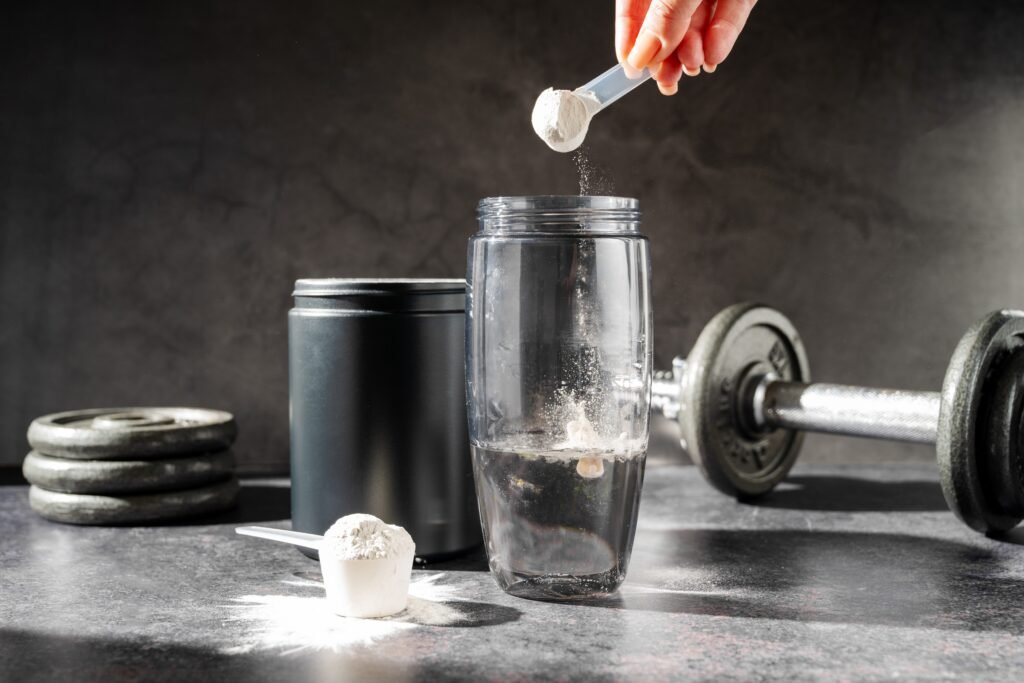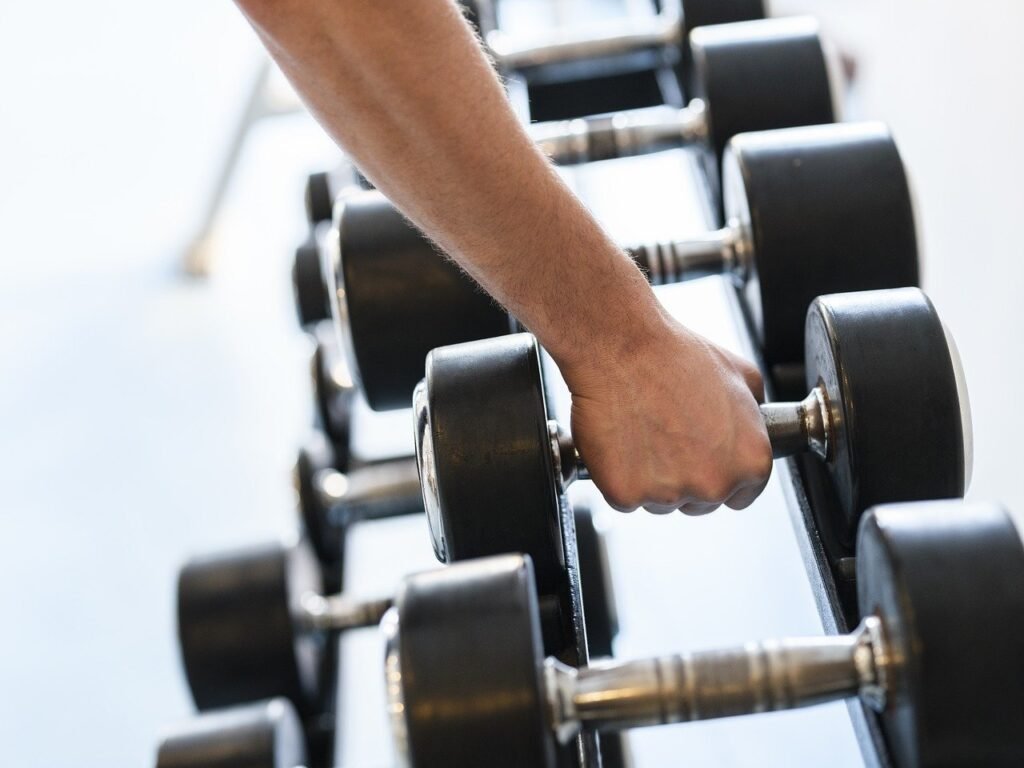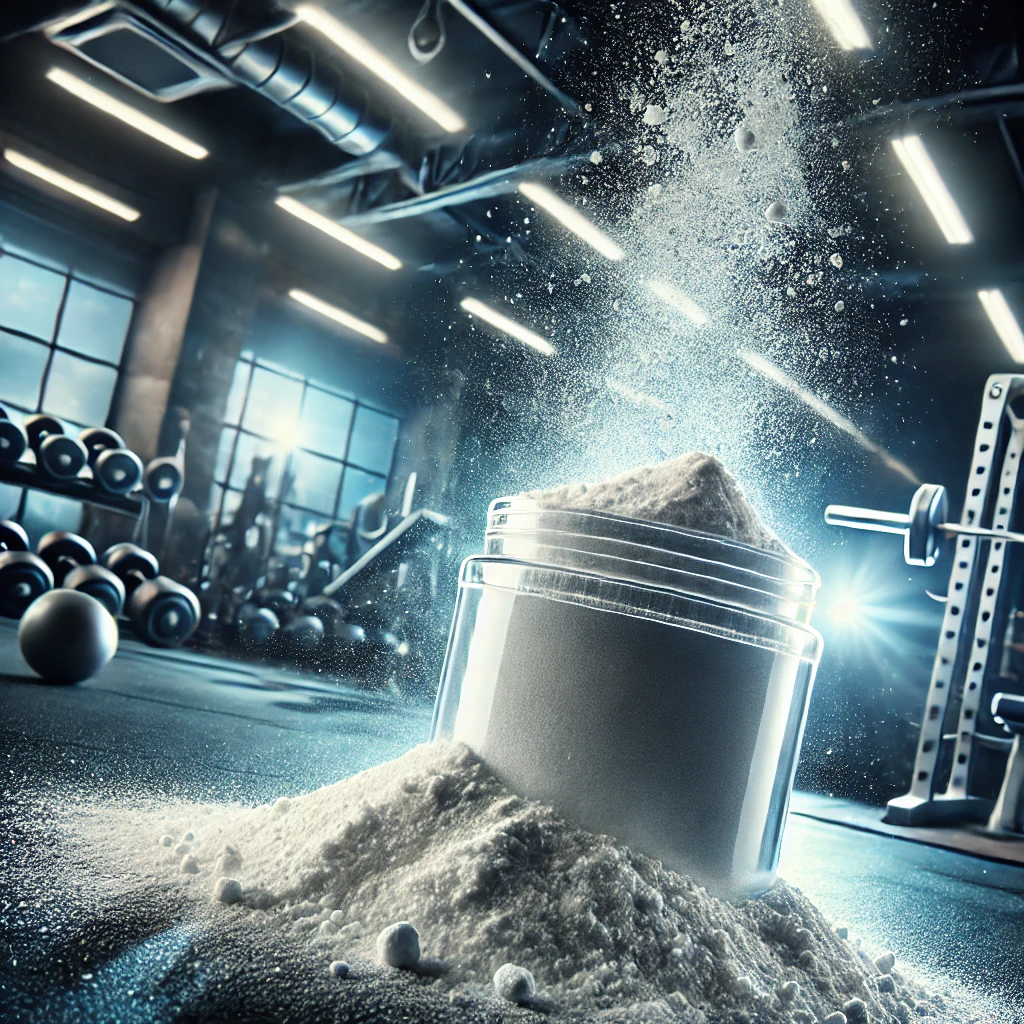In the world of fitness, few supplements are as popular and well-researched as creatine. It’s widely used by athletes, bodybuilders, and gym-goers to enhance athletic performance, increase muscle mass, and support recovery. But one question often comes up: Does creatine cause weight gain?
Many people want to know if creatine will make them gain weight, and whether this weight is in the form of fat, muscle, or water. In this article, we’ll dive deep into how creatine works, how it affects body weight, and why this weight gain can actually be a good thing for your fitness goals.
By the end of this guide, you’ll understand the role creatine plays in weight gain, how to use it correctly, and what to expect when adding it to your supplement regimen. Let’s get started!
What is Creatine?
Creatine is a naturally occurring substance found primarily in muscle cells. It’s composed of three amino acids: arginine, glycine, and methionine. While your body produces some creatine, you can also get it from foods like red meat and fish. However, many people choose to supplement with creatine because it can be difficult to consume enough through diet alone.
The most common form of creatine supplement is creatine monohydrate, which has been extensively studied for its safety and effectiveness. But before diving into the relationship between creatine and weight gain, it’s essential to understand how creatine works in the body.

How Does Creatine Work?
Creatine plays a pivotal role in energy production, specifically in the generation of adenosine triphosphate (ATP), which is the primary energy currency for your cells. During high-intensity, short-duration activities like sprinting, lifting weights, or any other explosive exercise, your muscles need quick energy. ATP is the molecule that provides this energy.
However, ATP stores in the muscle cells are limited and get depleted quickly during these intense efforts. This is where creatine comes in:
- Creatine Phosphate Donation: Creatine is stored in your muscles as creatine phosphate. It donates a phosphate group to adenosine diphosphate (ADP), helping regenerate ATP more rapidly.
- Faster Energy Recovery: By increasing ATP production, creatine helps your muscles maintain high performance for a longer period, delaying fatigue.
In simple terms, creatine enables your muscles to produce energy more efficiently during high-intensity, short-duration efforts. This leads to stronger muscle contractions and better overall performance in activities like weightlifting, sprinting, and other power-based sports.
Does Creatine Cause Weight Gain?
The key question on everyone’s mind is: does creatine cause weight gain? The answer is yes, but it’s crucial to understand the type of weight gain you’ll experience when using creatine. The weight you gain with creatine supplementation is typically seen as a positive outcome for most athletes and bodybuilders, as it usually results in increased muscle mass and water retention inside the muscle cells.
There are two main types of weight gain associated with creatine use:

1. Water Retention in Muscles
One of the most immediate effects of creatine supplementation is intramuscular water retention. When creatine enters your muscle cells, it draws water along with it, increasing the overall water content inside the muscles. This process makes your muscles look fuller, larger, and more defined.
- Intramuscular vs. Subcutaneous Water Retention: The key distinction here is that the water retention caused by creatine happens inside the muscle cells, not beneath the skin (subcutaneous water). This means that you’re unlikely to experience the bloating commonly associated with water retention in other parts of the body.
- Visual Impact: The extra water stored in your muscles can give you a more muscular appearance. Many athletes find that this fuller look is desirable, as it enhances their physique and gives them more confidence in the gym.
2. Lean Muscle Mass Gain
While water retention accounts for some initial weight gain with creatine, the more important and long-term effect is an increase in lean muscle mass. Creatine allows you to push harder during workouts, lift heavier weights, and perform more repetitions, leading to greater muscle gains over time.
- Improved Training Capacity: Creatine helps you train at a higher intensity by boosting your available energy. This means you can do more work during each session, leading to more significant muscle damage (in a good way) and, ultimately, muscle growth.
- Enhanced Muscle Protein Synthesis: Studies show that creatine can also increase the rate of muscle protein synthesis, the process by which your body repairs and builds new muscle fibers after exercise. By boosting this process, creatine helps your muscles grow larger and stronger over time.

Why Creatine Weight Gain Is a Positive Thing
Some people worry and ask does creatine cause weight gain, assuming that it will lead to unwanted fat or bloating. However, the type of weight gained with creatine is typically beneficial, especially for athletes and fitness enthusiasts looking to build muscle, improve performance, or enhance their physique.
Here’s why creatine weight gain is a good thing:
1. Increased Muscle Volume
- The additional water content inside your muscle cells gives them a more pronounced, fuller look. This not only improves your appearance but also creates an ideal environment for muscle growth, as hydrated muscles function more efficiently.
2. Enhanced Strength and Power
- By increasing the amount of available ATP in your muscles, creatine allows you to perform at a higher intensity for longer. This translates into better strength and power output, helping you lift heavier weights, complete more reps, and achieve better overall performance.
3. Faster Recovery
- Creatine can help reduce muscle soreness and accelerate recovery after workouts. This allows you to train more frequently and with greater intensity, further promoting muscle growth and enhancing your overall fitness progress.

Does Creatine Make You Gain Fat?
A common concern among those new to creatine is whether the weight gained from creatine is fat. The simple answer is no. Creatine does not cause an increase in body fat.
- The Weight Gained Is Not Fat: The weight gain you experience from creatine is due to two factors: increased water retention inside the muscles and lean muscle mass growth. Neither of these factors involves gaining fat.
- Improved Body Composition: In fact, by increasing lean muscle mass and enhancing your ability to perform high-intensity workouts, creatine can help improve your overall body composition. You may notice an increase in muscle size and strength, which often leads to a lower body fat percentage in the long term.

Breaking Down the Benefits of Creatine
Beyond weight gain, creatine offers a wide range of benefits that make it one of the most effective and popular supplements in the fitness world. Whether your goal is to increase muscle size, improve athletic performance, or enhance recovery, creatine can play a significant role.
1. Enhanced Athletic Performance
One of the most well-known benefits of creatine is its ability to improve performance in high-intensity, short-duration activities. This makes it especially useful for:
- Strength Training: Creatine has been shown to significantly boost strength, allowing athletes to lift heavier weights and perform more reps.
- Power-Based Sports: For activities like sprinting, jumping, and weightlifting, creatine helps maintain peak performance for longer periods, delaying fatigue and allowing athletes to push harder.
- High-Intensity Interval Training (HIIT): During HIIT workouts, creatine helps maintain energy levels, allowing for better performance during short bursts of intense activity.

2. Supports Muscle Growth
Creatine’s role in muscle growth is one of the primary reasons bodybuilders and strength athletes use it. Here’s how creatine promotes muscle hypertrophy:
- Increased Cellular Hydration: By pulling water into muscle cells, creatine increases the cell’s volume, creating an optimal environment for growth. This signals the body to ramp up protein synthesis, the process by which new muscle fibers are built.
- Boosts Muscle Protein Synthesis: Studies show that creatine supplementation can enhance the body’s ability to synthesize new muscle proteins after exercise, leading to more significant muscle growth over time.

3. Aids in Recovery
Post-workout recovery is a critical component of any fitness regimen, and creatine can play a major role in speeding up this process:
- Reduces Muscle Damage: Creatine has been shown to reduce the amount of muscle damage caused by intense exercise. This leads to less soreness and a quicker recovery.
- Replenishes Glycogen: Creatine can help replenish glycogen stores more quickly after exercise, ensuring that your muscles are ready for your next workout.

4. Cognitive and Health Benefits
In addition to its physical benefits, creatine may also have positive effects on brain function and overall health:
- Improves Brain Function: Some studies suggest that creatine supplementation can enhance cognitive function, particularly in tasks that require short bursts of energy, similar to its effects on physical performance.
- Neuroprotective Effects: There is growing evidence that creatine may have neuroprotective properties, potentially helping to prevent or slow the progression of neurological diseases like Alzheimer’s and Parkinson’s.
Creatine and Muscle Growth: How It Works
Creatine is one of the most effective supplements for muscle growth, making it a favorite among bodybuilders and strength athletes. But how exactly does it help you build muscle, and how does this relate to weight gain?
1. Increases Training Volume and Intensity
By increasing your body’s available ATP, creatine allows you to lift heavier weights and perform more repetitions during your workouts. Over time, this additional workload translates into greater muscle gains.
- Delayed Fatigue: Creatine helps delay the onset of fatigue, allowing you to push harder during your workouts and achieve a higher level of muscle activation.
2. Promotes Cellular Hydration
Creatine draws water into your muscle cells, increasing their overall volume. This creates a more anabolic environment, meaning that your muscles are primed for growth.
- Signals for Growth: The increased water content inside muscle cells acts as a signal to your body to ramp up protein synthesis and other processes involved in muscle growth.
3. Enhances Muscle Fiber Recruitment
Creatine improves the activation of fast-twitch muscle fibers, which are the fibers most responsible for generating power and promoting muscle growth.
- More Thorough Muscle Activation: With creatine, you can achieve a more thorough muscle activation during each set, leading to better overall muscle gains.
4. Boosts Protein Synthesis
Creatine has a direct impact on muscle protein synthesis, the process by which your body repairs and builds new muscle tissue after exercise. It also helps slow down protein breakdown, ensuring that more of the muscle you build stays intact.

Understanding the Types of Weight Gain from Creatine
It’s important to understand that the weight gained from creatine is not fat, but rather comes from increased water retention and muscle mass growth. This weight gain is typically a positive outcome for those looking to improve their physique and athletic performance.
- Improves Body Composition: By increasing lean muscle mass and decreasing fat, creatine helps improve your overall body composition. This is beneficial for both aesthetic and functional purposes.
- Enhances Aesthetics: More muscle volume means a more defined and muscular look, which is a desirable outcome for most fitness enthusiasts.
Common Misconceptions About Creatine and Weight Gain
Despite its benefits, there are still some misconceptions surrounding creatine, especially when it comes to weight gain and appearance:

1. Myth: Creatine Causes Fat Gain
This is one of the most common myths about creatine. The truth is, creatine does not cause fat gain. The weight gain experienced with creatine use comes from water retention and muscle mass growth, not fat. Creatine’s role in increasing lean body mass actually helps improve your body composition, making it easier to reduce fat over time.
2. Myth: Creatine Causes Bloating
Another common misconception is that creatine causes bloating. However, the water retention associated with creatine use occurs inside the muscle cells, not under the skin. This means that creatine does not cause the type of bloating that people often associate with water retention. Instead, it makes muscles look fuller and more defined.
How to Take Creatine for Maximum Results
To maximize the benefits of creatine and minimize any potential side effects, it’s important to use it correctly. Here’s a breakdown of how to take creatine for optimal results:
1. Loading Phase vs. Maintenance Phase
There are two phases to creatine supplementation: the loading phase and the maintenance phase.
- Loading Phase: During the loading phase, you take a higher dose of creatine (around 20g per day) for 5-7 days to saturate your muscles with creatine. This phase helps you experience the benefits of creatine more quickly.
- Maintenance Phase: After the loading phase, you reduce the dosage to 3-5g per day to maintain high creatine levels in your muscles. The maintenance phase ensures that you continue to experience the benefits of creatine without needing to take large doses.
2. Best Time to Take Creatine
The best time to take creatine depends on your personal preference and workout routine. Some people prefer to take creatine before their workout, while others take it afterward. Both options are effective, but some studies suggest that post-workout creatine consumption may be slightly more beneficial for muscle growth.
3. Consistency is Key
Regardless of when you take creatine, the most important factor is consistency. Taking creatine every day ensures that your muscles remain saturated with creatine, allowing you to reap the full benefits.
4. Stay Hydrated
Since creatine draws water into your muscles, it’s crucial to drink plenty of water while using creatine to avoid dehydration. Aim to drink at least 8-10 glasses of water per day to support your body’s increased water needs.

Conclusion: Does Creatine Cause Weight Gain?
So, does creatine cause weight gain? Yes, but it’s important to understand that this weight gain is generally a positive thing. The increase in body weight comes from increased water retention in muscles and lean muscle mass growth, both of which are desirable outcomes for athletes and fitness enthusiasts.
Creatine is one of the most well-researched and effective supplements available, offering a wide range of benefits, including improved strength, enhanced athletic performance, increased muscle mass, and faster recovery. If your goal is to build muscle, improve performance, or achieve a more muscular physique, creatine can be a powerful tool to help you reach your fitness goals.
As with any supplement, it’s important to use creatine correctly, stay hydrated, and maintain a balanced diet and exercise program to maximize its benefits. To find the best creatine supplement for your needs, check out our guide to the Top 10 Best Creatine Supplements.
FAQs: Does Creatine Cause Weight Gain?
1. Does creatine make you gain fat?
No, creatine does not cause fat gain. The weight gain associated with creatine comes from increased water retention in muscles and lean muscle mass growth.
2. Can creatine cause bloating?
Creatine does not cause bloating in the traditional sense. The water retention from creatine occurs inside the muscle cells, not under the skin, so it leads to fuller muscles rather than bloating.
3. How much water should I drink while taking creatine?
It’s important to stay hydrated while using creatine. Aim to drink at least 8-10 glasses of water per day to support the increased water content in your muscles.
4. Is creatine safe for long-term use?
Yes, numerous studies have shown that creatine is safe for long-term use when taken at the recommended doses. It’s one of the most researched supplements on the market.
5. Should I take creatine every day?
Yes, taking creatine daily ensures that your muscles remain saturated with creatine. Consistency is key to experiencing the full benefits of creatine supplementation.
By understanding how creatine works and its effects on weight gain, you can make an informed decision about adding it to your fitness routine. The weight gained from creatine is primarily lean muscle mass, which is exactly the type of weight gain most fitness enthusiasts strive for.









